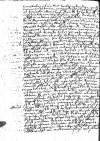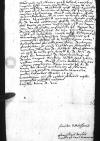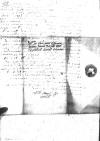Video de profectione ⌊huc⌋ sua Reverendissimam Dominationem Vestram nonnihil vacillare ac magis in eam partem inclinare, quod istic manere velit. Quae res valde perturbavit animum meum, nam de mure metuo, si non venerit Reverendissima Dominatio Vestra, cuius praesentia sola plurimum esset momenti allatura. Nemo enim in hac quidem causa plus esset auctoritatis habiturus.
⌊Constellatus⌋ simul ut venit, a ⌊primate⌋ prandio est exceptus. Sub horam vesperarum ad ⌊reverendissimum dominum⌋ adiit, cum eo pleraque de causa contulit, habere se multa gloriatus est, quae de rebus controversis omnem essent dubitationem sublatura, maxime de commendatoria, de Pfundczoll, de Hel. Tum ⌊reverendissimus dominus⌋ exhiberi mihi iussit, ut ego tempore opportuno de iis informationem darem. Facturum se recepit. Existimabat fortasse me ad se venturum, sed cum quattuor prope dies commoratus spe sua frustratus esset, fuit eum morae pertaesum. Itaque misit ad me magistrum Thomam, morbum excusavit, quod ad me non venisset, ut se languentem viserem petiit. Respondi me facturum id pridem fuisse, si per graves occupationes meas licuisset, a quibus cum essem vacuo animo futurus, non me quin venirem recusaturum. Postridie cum essem in summa missa, misit iterum ad me, ut ad prandium venirem. Respondi me cum ⌊reverendissimo domino⌋ pransurum, quod solum id tempus haberem in comitiis cum eo agendi. Sub horam vesperarum iterum famulus nuntiavit expectare dominum, ut venirem et eum languentem viserem. Quoniam vero visum erat ⌊reverendissimo domino⌋, ut eum accederem, accessi. Bene sanum hominem reperi. Exspectabam illa, quae se exhibiturum iactabat, sed, quod est in proverbio, thesaurus carbones erant. Conabatur plurimis verbis ostendere, quod commendatoria, magistri piscatoris offici[um] et Pauczko idem sunt. Deinde Pfundczoll ex conspiratione civitatum ⌊Hansae⌋ durante adhuc ⌊ordine⌋ fuisse institutum; a marca duos denarios percepisse magistrum, terti[um] civitati cessisse; quod etiam nunc in ⌊Monte Regio⌋ ita observari: ⌊dominum ducem⌋ du[os] denarios, tertium civitatem percipere. Produxit deinde litteras, ante annos plu[s] minus decem et octo ⌊Gedani⌋ scriptas, quibu[s] „Helam, quam hactenus sine privilegio praedecessorum nostrorum tenuerunt, Gedanensibus damus et Pfundczoll”.
Ex hoc illius sermone notavi, quod Pfundczol[l] et Helam ad annum usque 1526 vigo[re] litterarum C., quibus commendatoria [et] officium magistri piscatoris inscribitur, possederint, ita ut hae litterae ad bona Puczko non pertineant. Magnam olim int[er] homines fidem fuisse dicebat, propterea minus exacte omnia scribi solita esse.
Respondi ad haec: ita revera fuisse, nam et soluta pecunia litteras obligationis receptas non fuisse, quod nemo futurum sperasset, ut post nonaginta demum annos soluta semel pecunia iterum repeteretur.
Afferebat multa de merit[is] Gedanensium deque studio erga ⌊regia[m] maiestatem⌋, de quo ne nunc quidem aliquid [esse] remissum. Si velit princeps, non modo bonis Pucensibus eos alacriter cessuros, sed etiam plura opinione hominum de s[uo] suppeditaturos. Nam quod Puczko attinet, de eo se n[on] laborare, sed quod indigne tractati sint, i[d] grave sibi accidisse.
Tum ego: „Neque ⌊maiestas⌋, inquam, regia de Puczko laborat, sed de dignitate sua, quam laesam esse putat, cum quod paritum decreto non est ex illius informatione lato, tum quod si pignore cessissent, parum idoneam esse maiestatem eius iudicarunt, cui crederent, quasi aut solven[do] maiestas eius <non esset>, aut solvere, quod deberet, recusaret”. Longum esset omnia perscribere, coram de iis agere mallem.
Mandavit mihi ⌊maiestas reginalis⌋, ut cras ad se venirem et totam sibi Pucensem causam explicarem. Quod cum fecero, facile quemadmodum sit in eam animata olfacere potero, et quicquid cognovero, faciam postea Reverendissimam Dominationem Vestram certiorem.
Scheda nondum lecta est ⌊maiestati regiae⌋ ex genu laboranti, sed cui tamen iam, Deo sit gratia, meliuscule est. Nuntii ⌊domini ducis⌋ absoluti sunt. De iure appellationis nihil est definitum. Causa inter Ketingos et Maraunenses utriusque consiliariis est commissa; itidem et de vectigalium onere. Reliquerunt hic collegam suum doctorem Francescum. Is nova legatione fungitur nomine illustris domini ⌊Alberti marchionis⌋ ea ipsa de re, de qua scripsit Reverendissima Dominatio Vestra.
A ⌊rege Romanorum⌋ venerunt dominus ⌊Sigismundus⌋ et doctor ⌊Langus⌋. Nondum auditi sunt. Plura vellem coram, quod si non dabitur, tum per aliam occasionem. Deum precor, ut Reverendissimam Dominationem Vestram diu servet incolumem et felicem. Cuius me gratiae commendo.



